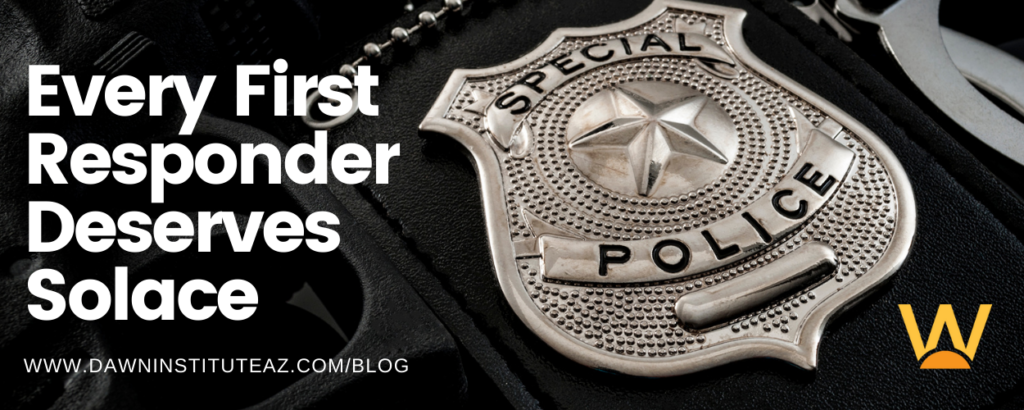“The experience I have had is that once you start talking about [experiencing a mental health struggle], you realize that actually you’re part of quite a big club.” — Prince Harry
I’m currently a 23-year veteran of a law enforcement agency. My career started as a patrol deputy for approximately 5 years. As a patrol deputy/first responder, I patrolled the streets responding to routine calls, as well as emergency calls for service. In my later years in patrol, I eventually became a field training officer where I trained new recruits on how to become law enforcement professionals. I was then selected to become a detective where my first detective assignment included investigating general crimes. Those crimes included property crimes as well as crimes against people. I then moved on to different detective assignments throughout the office such as intelligence, special victim’s unit, and specialized investigations. I have come to both a physical and mental understanding that being a first responder can lead to mental health diagnosis; left untreated the symptoms can only get worse, leading to grave depression, and sometimes suicide.
Something was wrong.
Nightmares, insomnia, indigestion, sweaty nights and worrisome thoughts plagued my daily life; my family bared the burden of mood swings, bouts of frustration and sadness. The reasons for the symptoms were unknown. I found myself in an unfamiliar mentally debilitating place. The stigmas that intruded my mind held me prison to symptoms without answers; I knew something was terribly wrong, but did not have answers. I considered reaching out for help, but fear was the obstacle. In my work environment, the symptoms I was experiencing would be viewed as a sign of weakness. Further, my daily work load demanded my full commitment. The daily duties and on call status never allotted me the time for self-care and to seek “what was wrong”. The environment I dedicated 23 years of my life did not provide me the support or encouragement to find comfort or answers.
Everyone needs a therapist.
I was speaking with my daughter one day on an unrelated subject and she made the comment, “everyone needs a therapist”. The next few days I contemplated what she said and decided to speak with a therapist. Although my insurance through my employer covers mental health, I decided to pay out of my own pocket. I was afraid any insurance claims may raise red flags about my mental health and fitness for duty. I began speaking with a therapist and spoke freely and putting my feelings on the table, to include certain feelings I experienced at certain times as well as recurring nightmares related to the job. I was diagnosed with severe anxiety as well as PTSD. I further discovered that these diagnoses were a direct result of my current profession. While working with my therapist, I eventually got to a place where I understood why I had certain feelings, to include severe anxiety. For example, I learned that my work issued phone brought me anxiety whenever it would ring, especially when I was in an “on call” status. This was due to the uncertainty of what type of call I would be responding to as a detective with the special victim’s unit.
I later came to understand anxiety, depression, and post-traumatic stress (PTSD) were slowly impeding my ability to provide self-help and self-love. I felt overwhelmed and guilty; furthermore, my guilt was wrapped around my inability to keep going. I could not and prior to my diagnosis, did not find a way to relieve my symptoms. Agencies such as the Center for Disease Control (CDC) and Substance Abuse and Mental Health Service Administration (SAMHSA) denote depression, post-traumatic stress, substance abuse, and suicidal ideation are behavioral health diagnosis prevalent to first responders; more than 30 percent of first responders develop PTSD. The SAMHSA and CDC provide research and data to help first responders acquire knowledge and awareness of mental health symptoms and treatment options.
A place of hope.
Currently, I am still trying to understand my symptoms and wonder if I will ever have a good night’s sleep. I wonder if my spouse will ever have a night where she does not have to awake me from nightmares. Will my daughter ever stop worrying about my nightmares. I am novice to the world of therapy, but it has provided me a place of hope. I never thought it was possible to talk about my symptoms, but I am thankful that there is someone who wants to listen and assist me in my need for answers.
The most important knowledge I have learned is the fact every human being can benefit from talking to a therapist. I have found therapy to be imperative and a lifetime process. With hindsight, I would give anything to rewind my days and learn everything I can about how my career could debilitate my mental health, and how therapy can change the trajectory. Having such knowledge would have positively impacted my mental health. While the saying, better late than never, describes my current journey, many first responders can’t wait to find answers.
Reach out for help.
It is my hope that my fellow first responders will find peace and be encouraged from my story. I encourage you to reach out for help. Secure a good therapist and begin exploring the feelings that have intruded your life and career. Mental health is directly related to physical health; the two intertwined and when one is strengthened the other is positively affected.
It is our privilege to support First Responders. At Dawn, we understand trauma and are here to help. Contact us for support.

